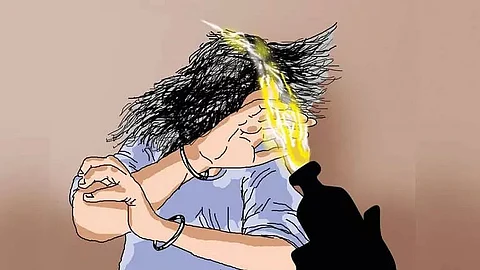
- Home
- Live Blog
- Breaking News
- Top Headlines
- Cities
- NE News
- Sentinel Media
- Sports
- Education
- Jobs

Acid attacks, also known as acid throwing, are one of the most brutal and inhumane crimes in society. This violent assault involves the deliberate act of throwing acid on another person’s body with the intent to cause disfigurement, injury, torture, or even death. The horrifying nature of acid attacks leaves victims with irreparable physical and emotional scars, affecting their entire lives. These attacks result in long-term consequences such as chronic scarring, disfigurement, and in many cases, blindness.
Acid attack victims not only suffer from severe physical injuries but also endure lifelong social and psychological trauma. Society often discriminates against these victims, making their reintegration difficult. Their economic independence is also impacted, as many struggle to find employment due to their disfigurement. The stigma attached to the scars left by acid attacks further isolates victims, leading to depression and mental health struggles.
Until 2013, acid attacks were not recognized as a separate criminal offense in India. However, after extensive legal reforms, the Indian Penal Code (IPC) introduced Sections 326A and 326B through the Criminal Law (Amendment) Act of 2013. These sections impose severe penalties for both actual and attempted acid attacks.
Section 326A states that anyone who causes permanent or partial damage, burns, maims, or disfigures another person using acid will be punished with imprisonment of no less than ten years, which can extend to life imprisonment, along with a fine. Additionally, Section 326B punishes those who attempt an acid attack with a prison sentence of up to seven years, along with a fine.
The majority of acid attacks are committed by individuals known to the victims. These attacks often stem from rejection of sexual advances, failed marriage proposals, unpaid dowries, personal revenge, jealousy, or disputes. In cases involving male victims, land and property disputes are common motivations. The ease of access to acid further contributes to the rise in these crimes, making stricter regulations necessary.
Recognizing the dangers posed by the easy availability of acid, the Supreme Court of India took a significant step in 2013 by regulating the sale of corrosive substances. The Ministry of Home Affairs (MHA) subsequently issued the Model Poisons Possession and Sale Rules, 2013, under The Poisons Act, 1919. These rules mandated that acid could not be sold over the counter without proper documentation.
Sellers are required to maintain a record of all acid sales, including the buyer’s identity, address, purpose of purchase, and the quantity sold. Additionally, buyers must provide a government-issued photo ID proving they are above 18 years of age. Failure to comply with these regulations can result in the seizure of acid stock and fines of up to Rs. 50,000.
To assist acid attack survivors, the Indian government has implemented several measures, including financial compensation, medical treatment, and social rehabilitation programs.
Compensation: Each state government is required to provide a minimum compensation of Rs. 3 lakhs to acid attack victims for their rehabilitation.
Free Medical Treatment: All hospitals, both public and private, must provide free medical treatment to victims, including reconstructive surgeries.
Reservation of Beds: Since acid attack victims often require multiple plastic surgeries, 1-2 beds in private hospitals may be reserved for their treatment.
Social Integration Programs: The government provides funds to NGOs for the social and economic rehabilitation of victims, helping them regain independence and dignity.
Acid attacks are among the most horrific crimes, leaving victims with permanent scars—both physical and emotional. While legal reforms and strict regulations have been introduced to curb such attacks, more needs to be done to enforce these laws effectively. Society must also play a role in supporting and reintegrating survivors rather than ostracizing them. Only through collective efforts can we eliminate this barbaric crime and ensure justice for the victims.
Also Read: Importance of Potassium
Also Watch: